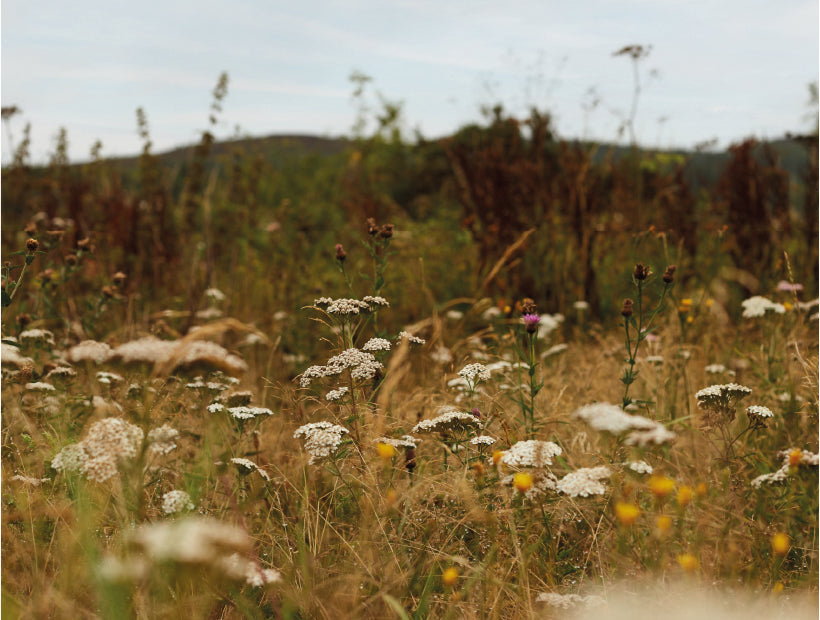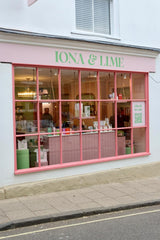Rhug Wild Beauty in Conversation with the Soil Association
Posted by TEAM WILD BEAUTY

The Soil Association celebrates ‘Organic September’ this month. As Wild Beauty products are all Soil Association COSMOS certified, this is a moment which resonates strongly both with us and Rhug Estate. Paige Tracey, Business Development and Marketing Officer, Soil Association Organic Beauty and Wellbeing took some time out recently to chat to us about Organic September and what it means for a brand to be Soil Association certified.
We have been hearing a lot about ‘Organic September’. Please can you explain what it entails?
Organic September is a consumer-focused campaign that aims to educate citizens on the benefits of organic farming for the climate, nature, and health. Lots of people will have heard the term “organic” but might be less sure of what it means. It is especially important that we can convincingly present organic farming as the brilliant, all-encompassing solution to the current ecological and climate crises that it is. To take just one example, soils on organic farms store twice as much carbon in them than non-organic[1], keeping more of this out of the atmosphere. By prohibiting the use of nitrogen fertilisers- which are created from fossil fuels- organic farms also use less energy than non-organic[2].

This year, your theme is ‘listen to nature’. Tell us more!
If nature could talk, we believe it would ask us to choose to farm organically. Organic farming works with and not against nature by prohibiting the use of artificial fertilisers, pesticides, and herbicides. This means organic farms are havens for wildlife and biodiversity. The Organic September campaign is focusing on three creatures - earthworms, ladybirds and bees - because they are so important for keeping our soils healthy and pollinating our crops. It makes no sense to farm in a way that destroys nature, otherwise there will be no way we can grow our crops in the future - let alone ingredients for beauty products! Working with nature and its “key workers” such as these is how we continue to protect the planet for future generations.
How do you think the beauty industry can become more sustainable?
The beauty industry lacks regulation on so many fronts, not least in regard to organic. In the food industry “organic” is a legally regulated term, yet no such legislation exists for using this label for beauty and wellbeing products. This means that companies can legally label products as “organic” even if they contain just 1% organic ingredients! In light of this, third party organisations like Soil Association Certification have developed rigorous standards that require companies to be truly sustainable in order to qualify for using their badge. Having the Soil Association Organic accreditation signals to a consumer that for example, Rhug Wild Beauty is more sustainable than a brand that labels itself “organic” without any certification to back this term up.

It is also important that different players work together. Soil Association Certification is proud to be an Advisory Board Member for the British Beauty Council’s Sustainable Beauty Coalition, which sees us working alongside other stakeholders to push through positive change. Our definition of “organic” was used in the British Beauty Council’s “Planet Positive Beauty Guide”, putting it front and centre for consumers who are wondering what organic beauty and wellbeing means.
Why is the organic Soil Association certification so important?
As mentioned above, the term “organic” is barely regulated in the beauty industry. For example, an “Organic Rosemary Shampoo” without certification might contain organic rosemary, yet this could be the only organic ingredient within it.
This is why the Soil Association helped to develop the international COSMOS standard for Organic cosmetics, which Rhug Wild Beauty certifies to, so consumers have guidelines they can trust. In a COSMOS certified product, 95% of the ingredients grown on farms and then physically processed, for example by drying and crushing, must be organic. The certification standard not only ensures this safeguarding of the term “organic”, but it also guarantees a beauty product has gone through checks on sustainability from the farm the ingredients are grown on, to the processing and packaging facilities, as these must all be inspected and certified by an independent body, like us.
It is certainly one of the most rigorous standards out there when it comes to sustainability. Any physical or chemical processing of ingredients needs to be in line with the principles of Green Chemistry. Certain processes that could be harmful to human or environmental health, such as irradiation, are not permitted. Furthermore, only non-toxic cleaning products can be used in manufacturing facilities. In terms of the product formulation, we prohibit certain ingredients in addition to certifying the ones we do permit. Those that we do not allow include parabens, phthalates, and synthetic plastics and microplastics. It is worth looking at our list of “Terrible Ten” ingredients for more insight on some of the ingredients we would never allow in our certified products (and which, therefore, would not be found in Rhug Wild Beauty’s products), but which can actually be found in some other beauty and wellbeing products that label themselves “organic” without certification!

Next week marks the start of Organic Beauty & Wellbeing week. How would you encourage people to get involved?
We have an Organic Beauty & Wellbeing week website hub which we keep up to date with the latest ways people can get involved! From here you can download your free “Nature would Choose Organic” social media pack, to help us spread the message using our gorgeous new imagery which encapsulates the beauty of nature. We’re also encouraging people to join in our “Listen to Nature” ASMR campaign on Instagram- the details on this can also be found in the pack. If you’d like to hear the inspirational stories behind our certified organic brands, including Rhug Wild Beauty, we have interviewed a selection of founders which can also be viewed on our website.
I’d also encourage people to sign up to our virtual panel roundtable, “Listen to Nature with Certified Organic Beauty & Wellbeing”, which is taking place on Friday 16th September at 3pm. This will be a discussion of our headline messaging for the week and it will be chaired by Katie White, founder of the award winning facial salon Re:lax London, who has used certified organic products throughout her career.
What are your top tips for making organic lifestyle swaps?
Opting for certified organic beauty and wellbeing products next time you shop is a brilliant place to start! We have a directory of all certified brands on our website so you can easily opt for those that are meeting the gold standard of sustainability. The Soil Association website also has directories to find your local independent organic retailer and local organic box scheme. Sign up for our Organic Living newsletter for regular updates and inspiration on how to live an organic lifestyle.
Organic Beauty & Wellbeing Week is a campaign that is part of Organic September, which has a specific focus on certified organic products in this category. This year, it is taking place 12th-18th September.

Our General Manager Jessica will also be speaking at the Organic Beauty Week panel hosted by The Soil Association at Planet Organic, Tottenham Court Road on Tuesday 13th September, 6pm. Wild Beauty and Planet Organic will also be joined by panellists from Evolve Beauty to discuss all things greenwashing along with the environmental and social impact of the organic beauty industry and what it truly means to be certified organic.
[1] Gattinger, A., Muller, A., Haeni, M., Skinner, C., Fliessbach, A., Buchmann, N., Niggli, U. (2012). Enhanced top soil carbon stocks under organic farming. Proceedings of the National Academy of Sciences of the United States of America, 109(44), 18226–31.
[2] Smith et al. (2015) The energy efficiency of organic agriculture: A review. Renewable Agriculture and Food Systems, 30, 3




